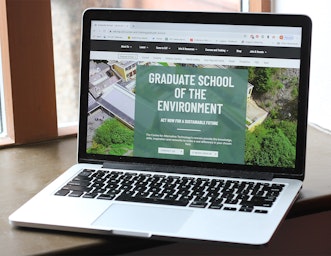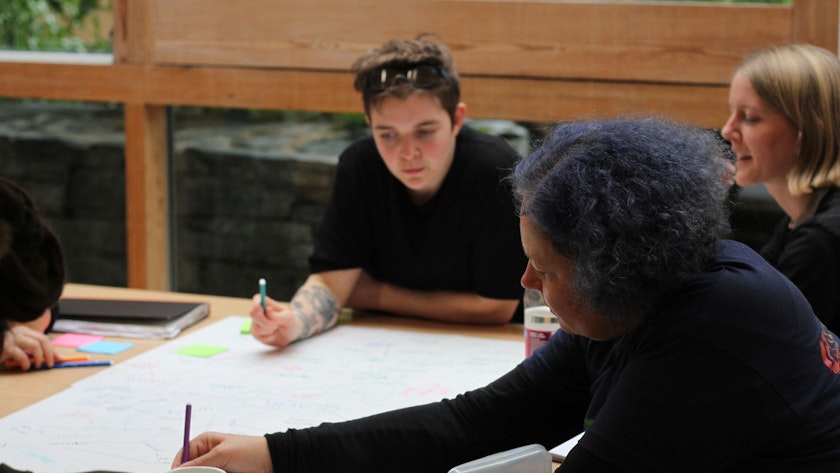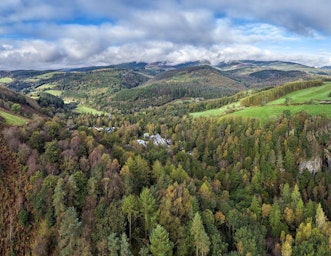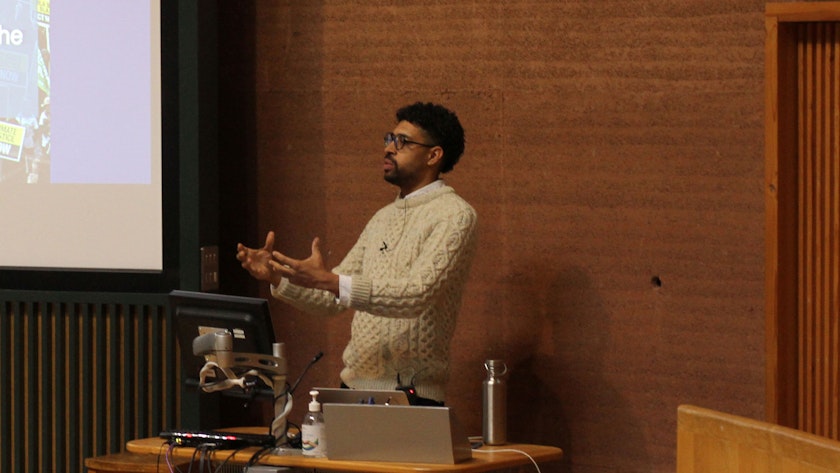
Why we teach… futures literacy for sustainability transformation
April 7, 2023Home » Why we teach… futures literacy for sustainability transformation
Next in our new series looking at themes and topics explored by students on CAT Masters degrees, Dr Ruth Stevenson looks at how we can plan for an uncertain future – what it means, why it matters and some of the main teaching methods used on our courses.
The climate and biodiversity crisis cannot be tackled with the same practices and mindsets that created it. The need to transform our current systems has long been recognised, with the Intergovernmental Panel On Climate Change (IPCC) as long ago as 2012 calling for a “fundamental qualitative change … that … involves a change in paradigm and may include shifts in perception and meaning, changes in underlying norms and values, reconfiguration of social networks and patterns of interaction, changes in power structures, and the introduction of new institutional arrangements and regulatory frameworks.”
However, each year national decision makers at the UNFCCC Conference of the Parties (COP) struggle to develop a clear and coordinated vision of the future and understand the depth of change needed, let alone establish the ethics involved in that transformation. The aim of the ‘Introduction to Sustainability and Adaptation Concepts in Practice’ module run by the Graduate School at CAT is to get to grips with these difficult issues.
Find out more about CAT postgraduate courses on one of our virtual or in-person open days
Why is futures literacy for sustainability transformation important?
To successfully achieve a more sustainable future we need to:
- take a systemic approach to generating knowledge and designing interventions;
- understand that our efforts to intervene can have unintended consequences;
- move beyond ‘predictions’ and encourage people to imagine possible futures;
- acknowledge the uncertainty the future holds.
Changemakers need to be skilled facilitators and contributors in this space.
This module therefore forefronts ‘futures literacy’ – the ability to deal with uncertainty and complexity and acknowledge that our actions will have consequences, partly by understanding the past and how it has shaped the present, and also by ‘testing’ a variety of possible futures.
Futures literacy is a key skill for transformational change. Most people struggle to think of a future that is not just an extension of the current state. However, the COVID-19 pandemic has taught us that transformational change can take place, whether we plan for it or let it happen to us. While we will need to adapt to the ‘new’ potential futures being shaped by climate change, we must also transform our practices as we do this.
What are the key aspects to consider?
The module is embedded in systems thinking, from its delivery to its learning outcomes. Students are brought together across the MSc courses at CAT to engage in cross-disciplinary working, vital to generate transformational ideas for a sustainable future. This also supports students’ understanding of complex and dynamic social, ecological and technological systems. It enables them to see how ‘seeds’ of ideas that we have now can potentially have long-term positive influences across many disciplines, but also unintended consequences if not considered systemically.
What are the main teaching methods?
The students work in facilitated small groups to carry out three days of future visioning and scenario planning. Participating in person and online, they practise co-creating knowledge and ideas. They engage with the different experiences and world views of others, while considering their own power and privilege.
Students are supported in their learning by lectures from contributors from across the globe. Importantly, the module makes space for indigenous knowledges and voices that are less prevalent in academia, acknowledging that we need to be open to different ways of thinking about sustainability.
Acknowledging that the future is uncertain, the students consider a variety of potential futures. After structured discussion, they describe and critique these different scenarios or
‘worlds’:
- What does the landscape look like?
- How do people work and travel?
- What are the energy structures?
- Who makes decisions?
- What values underpin the systems?
- Whose voices are represented and unrepresented?
This story-based approach allows the students to go beyond predictions, targets and roadmaps to understand what transformational change ‘feels’ like. It allows them to engage safely with some of the more difficult emotions and beliefs around the climate and biodiversity crisis.
IMAGE: Student learning is supported by lectures on a range of topics that help them explore different aspects of possible futures – image shows Dr Leon Sealey-Huggins’ contributing lecture exploring issues around climate justice.
“The process is really empowering and inspiring. It reminds us that the future doesn’t just happen, it’s created, and can be changed. And it helps us explore ways in which we might most effectively create the changes we want to see in the world.” Student, November 2022.
The final stage of the module is spent developing transformational ideas that would support change towards the better worlds depicted during the group work, or at least avoid the worst. Students start to understand that transformational change needs to be systemic and structural, and developed through co-creative inclusive practices. Each student then develops their own ideas for transformational interventions in an assignment.
How do students use this learning?
The students’ futures literacy supports better decision-making practices and outcomes in the various disciplines they are studying and, ultimately, in their work as changemakers outside CAT. It supports the systemic thinking needed to deal with the complex issues in our socio-ecological-technical world. The development of the transformational adaptation concept for the assignment can be one of the most challenging but also most rewarding parts of the learning from this module. And the experience of listening respectfully to others’ points of view supports students in developing and engaging in ethical and creative processes of change in the real world.
“This latest module has honestly been life changing for me. …I feel like a different person. …through this piece of coursework I am finding inspirational examples of hope and imagining new possibilities.” Student, November 2022

About the author
Ruth is an environmental social scientist, lecturing across the range of taught and research postgraduate courses at CAT. Drawing on experience in renewable energy consultancy, policy making and academic research on policy and discourse she focuses on the nature of socio-technical transformations and working towards social and behavioural transformation.
She works closely with CAT’s Zero Carbon Britain Hub to implement systemic change at grassroots and institutional levels.
Study with us
Find out more about CAT Masters degrees, join an on-site or virtual open day, and explore what funding might be available to you – visit our Graduate School web pages or contact Alis here or on +44 (0)1654 705953.
- Graduate School
- News Feed
Related Topics
Related Pages
Related events


On-site Open Day: MSc & MRes Courses
17th May 2024
Graduate School Postgraduate Funding Webinar
20th May 2024
Virtual Open Day: MArch Sustainable Architecture Part 2
27th May 2024GRADUATE SCHOOL OF THE ENVIRONMENT
ACT NOW FOR A SUSTAINABLE FUTURE
Learn more about our exciting postgraduate courses and sign up for our emails to stay up-to-date on all the latest.


